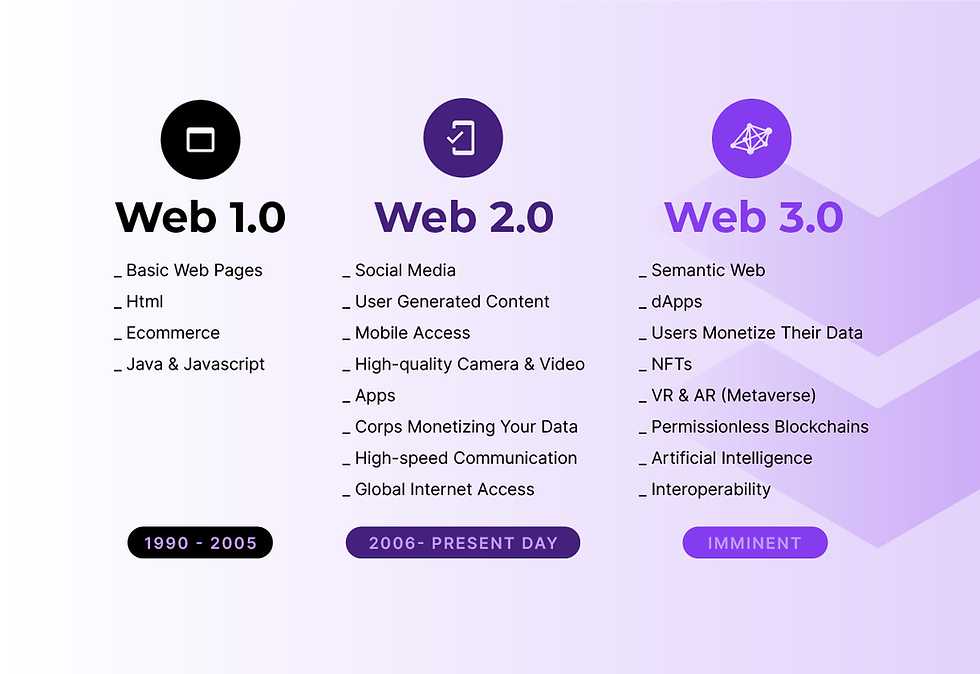How Web 3.0 Will Transform Businesses in USA
- Aug 5, 2025
- 7 min read
The Rise of Web 3.0 and Its Business Impact in the USA

Introduction: A New Era of the Internet
The internet has gone through multiple phases of evolution. Web 1.0 introduced the first websites — static pages with limited interactivity. Web 2.0 brought dynamic platforms, social media, e-commerce, and user-generated content, powering the digital economy we know today.
Now, we are entering Web 3.0 — the decentralized internet built on blockchain, AI, IoT, and advanced cryptography. Unlike its predecessors, Web 3.0 is not controlled by centralized corporations. Instead, it empowers users, businesses, and communities with ownership, transparency, and trust.
For the United States, the adoption of Web 3.0 is set to reshape industries, revolutionize customer engagement, and open new revenue streams. With its innovation hubs in Silicon Valley, New York, and Austin, and its regulatory leadership, the USA will be a global epicenter for Web 3.0 transformation.
What Makes Web 3.0 Different from Web 2.0?
Feature | Web 2.0 | Web 3.0 |
Data Ownership | Controlled by tech giants (Google, Meta, Amazon) | Owned by users on blockchain |
Transactions | Through intermediaries (banks, platforms) | Peer-to-peer via smart contracts |
Trust Mechanism | Centralized systems and verification | Decentralized consensus (blockchain) |
Monetization | Ads, subscriptions, centralized e-commerce | Tokenization, NFTs, decentralized marketplaces |
AI & Automation | Limited personalization, algorithm-driven | Deep integration with AI, IoT, and ML |
📊 Stat: Deloitte predicts that Web 3.0-driven digital transactions in the USA will surpass $3 trillion by 2030.
Business Benefits of Web 3.0 for US Enterprises
Web 3.0 offers game-changing advantages for businesses across industries in the USA:
Enhanced Trust & Transparency – Blockchain eliminates fraud and creates audit-ready systems.
Cost Reduction – Smart contracts reduce dependency on intermediaries.
New Revenue Models – Token economies, NFTs, and DeFi platforms unlock new monetization opportunities.
Decentralized Data Control – Businesses and users own their data, enhancing compliance with US privacy regulations.
AI-Driven Efficiency – Automated decision-making powered by real-time data.
1. Finance & Banking (DeFi Revolution)
The US financial system will shift from centralized banking to Decentralized Finance (DeFi).
Faster, cheaper cross-border payments.
Smart contracts eliminating middlemen in lending, insurance, and trading.
Tokenized assets for investment diversification.
📌 Case Study: US banks adopting blockchain payments can save 30–50% on annual transaction costs.
2. Healthcare & Pharmaceuticals
Blockchain-based electronic health records shared securely across hospitals.
Patients gaining control over their medical data.
IoT-enabled real-time monitoring of patients.
AI-based predictive treatments reducing costs.
📊 Fact: The US could save $200 billion annually by reducing inefficiencies through Web 3.0-enabled healthcare systems.
3. Real Estate & Property
Smart contracts simplifying property transactions.
Tokenized real estate offering fractional ownership.
Immutable property registries reducing fraud.
Virtual real estate opportunities in the metaverse.
📌 By 2030, 20% of property transactions in the US may be blockchain-based.
4. Supply Chain & Manufacturing
Transparent blockchain-led tracking of goods.
Fraud prevention in high-value industries (pharma, aerospace).
Real-time insights reducing wastage and inefficiency.
📌 Walmart USA already uses blockchain to track food supply, reducing traceability time from 7 days to 2.2 seconds.
5. Retail & E-Commerce
Crypto payments and tokenized loyalty programs.
AI-driven personalization improving conversions.
AR/VR experiences integrated with blockchain ownership validation.
📊 Stat: US e-commerce crypto payments are projected to exceed $1.4 trillion by 2028.
Overcoming Challenges & Pearl Organisation’s Role in Web 3.0 USA Transformation
Challenges in Web 3.0 Adoption for US Enterprises
Despite opportunities, businesses must overcome:
Regulatory Uncertainty – Crypto and blockchain face ongoing regulation in the USA.
Integration Complexity – Migrating from Web 2.0 to Web 3.0 requires hybrid strategies.
Skill Gaps – Shortage of blockchain and AI professionals in the US workforce.
Cybersecurity Risks – Decentralized platforms are vulnerable if not properly secured.
This is why enterprises need a trusted partner like Pearl Organisation to navigate Web 3.0 adoption strategically and securely.
Pearl Organisation: Driving Web 3.0 Adoption in USA
Pearl Organisation delivers end-to-end Web 3.0 solutions for US businesses, including:
1. Blockchain Development
Smart contract design.
Tokenization and NFT platforms.
Decentralized applications (dApps).
2. AI & Automation
Predictive analytics for finance, healthcare, and retail.
AI-powered chatbots for customer engagement.
Machine learning models for real-time personalization.
4. Metaverse & AR/VR Experiences
Immersive digital showrooms for US retailers.
Virtual offices for enterprises.
Gaming and entertainment ecosystems.
5. Cybersecurity & Compliance
Blockchain security audits.
Compliance with US data laws (HIPAA, CCPA, GDPR).
Decentralized identity management.
Why US Enterprises Trust Pearl Organisation
Global presence: Serving clients in 150+ countries.
Proven results: 96% project success rate.
Industry expertise: Deep knowledge across finance, healthcare, retail, and logistics.
Compliance-first: Solutions tailored for US regulations.
Future-ready: Integrations with AI, blockchain, IoT, and the metaverse.
The Future of Web 3.0 in USA: What’s Next?
Mainstream DeFi adoption → Banks and credit unions embracing decentralized finance.
Government-backed blockchain systems → Secure voting and public services.
Web 3.0 talent boom → Demand for blockchain developers rising by 300% in the US by 2027.
Metaverse economy → Virtual workspaces, events, and real estate becoming mainstream.
Conclusion: Partnering for a Decentralized Future
Web 3.0 is not just a technological upgrade—it is a paradigm shift in how businesses operate, engage customers, and generate value.
For enterprises in the USA, Web 3.0 will unlock growth, efficiency, and innovation like never before. However, success depends on having the right partner.
With its global expertise, compliance-first approach, and future-ready strategies, Pearl Organisation is the trusted partner for Web 3.0 adoption in USA, helping businesses thrive in this decentralized future.
👉 Learn more: Pearl Organisation
FAQ – How Web 3.0 Will Transform Businesses in USA
Q1. What is Web 3.0 and why is it important for businesses in the USA?
Web 3.0 is the next generation of the internet, built on blockchain, decentralization, artificial intelligence, and tokenization. Unlike Web 2.0, where data is owned by big corporations, Web 3.0 gives ownership back to users and businesses.
For US enterprises, Web 3.0 means:
Greater transparency through blockchain.
Reduced transaction costs by eliminating middlemen.
New revenue streams via NFTs, DeFi, and token economies.
Faster cross-border operations, essential for global trade.
📊 Stat: Gartner predicts 25% of global enterprises will integrate Web 3.0 technologies by 2027, with the USA leading adoption.
Q2. Which industries in the USA will be most impacted by Web 3.0?
The top industries in the USA to benefit include:
Finance & Banking → Smart contracts, DeFi, tokenized assets.
Healthcare → Blockchain health records, IoT-driven monitoring.
Real Estate → Tokenized property ownership and fraud-proof registries.
Supply Chain & Logistics → Blockchain tracking and AI-driven forecasting.
Retail & E-commerce → Crypto payments, AI personalization, and NFT loyalty programs.
Media & Entertainment → Direct-to-consumer NFT content and metaverse-based experiences.
📊 Example: Walmart USA reduced food traceability time from 7 days to 2.2 seconds using blockchain.
Q3. How will Web 3.0 change financial services in the USA?
Web 3.0 enables Decentralized Finance (DeFi), which transforms traditional banking by:
Cutting transaction fees by up to 50%.
Enabling 24/7 borderless transactions.
Offering crypto-based lending and investments.
Empowering microfinance for SMEs without middlemen.
📌 US banks adopting blockchain could save $10–12 billion annually in operational costs.
Q4. What role does Web 3.0 play in healthcare for US businesses?
In healthcare, Web 3.0 ensures patient data security, ownership, and accessibility:
Blockchain maintains tamper-proof medical records.
Patients control who accesses their health data.
IoT + AI integration allows real-time monitoring.
Predictive analytics reduces treatment costs.
📊 Fact: Web 3.0 could help the US healthcare sector save $200 billion per year by reducing inefficiencies.
Q5. How does Web 3.0 transform the US real estate industry?
Smart contracts automate property transactions.
NFT-based property tokenization enables fractional ownership.
Blockchain-based registries eliminate title fraud.
Metaverse real estate opens new digital investment opportunities.
📊 By 2030, 20% of US property deals may involve blockchain-based platforms.
Q6. How will Web 3.0 reshape e-commerce in the USA?
Crypto payments allow global expansion.
NFT rewards replace traditional loyalty points.
AI personalization increases conversion rates.
AR/VR shopping creates immersive retail experiences.
📊 US e-commerce crypto transactions are projected to hit $1.4 trillion by 2028.
Q7. What challenges will US enterprises face in adopting Web 3.0?
Regulatory uncertainties around crypto and blockchain.
Integration complexities with legacy Web 2.0 systems.
Skill shortages in blockchain and AI.
Cybersecurity threats if decentralized systems are poorly managed.
📌 This makes trusted partners like Pearl Organisation essential for smooth Web 3.0 adoption.
Q8. How can Web 3.0 improve supply chain and logistics in USA?
Real-time blockchain tracking for goods.
IoT devices ensuring accurate inventory data.
Fraud prevention in high-value industries like pharma and aerospace.
AI-driven predictive logistics cutting delays and costs.
📊 The US logistics industry could save 15–25% annually by adopting Web 3.0 technologies.
Q9. How will Web 3.0 impact US media and entertainment?
Direct-to-fan NFT sales, reducing reliance on record labels.
Metaverse concerts and events as new revenue streams.
Blockchain royalties, ensuring fair artist payments.
📊 Independent US musicians using NFTs earn 20–30% more compared to traditional streaming platforms.
Q10. Why should US enterprises choose Pearl Organisation for Web 3.0 adoption?
Pearl Organisation provides end-to-end Web 3.0 consulting and development, including:
With a 96% global success rate and expertise across 150+ countries, Pearl Organisation ensures US businesses transform with confidence.
Q11. What is the future of Web 3.0 for US enterprises?
By 2030, Web 3.0 will:
Make DeFi mainstream in US finance.
Enable blockchain-powered voting and governance.
Drive enterprise metaverse adoption for work and commerce.
Increase demand for Web 3.0 talent by 300%.
Create new billion-dollar industries in digital assets.
📊 McKinsey estimates Web 3.0 could add $4–5 trillion annually to the global economy by 2030, with the USA as the primary driver.






































